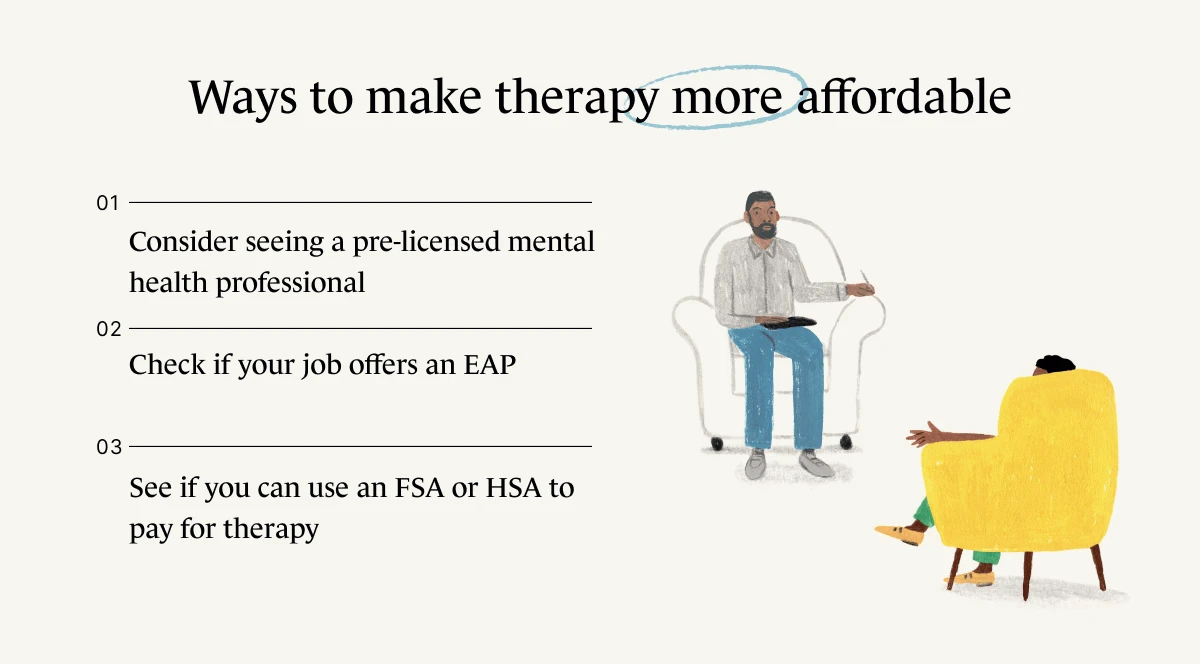Thinking about seeing a therapist or counselor? The cost of therapy and how to pay for therapy are almost certainly on your mind.
If you’re looking for a way to find affordable therapy and quality mental health care, we see you!
Whether or not you have health insurance, if you want to see a therapist, there are affordable and low-cost therapy options.
We understand that this process can feel confusing, and we want to help by illuminating some affordable behavioral health and low-cost therapy options.
Whether or not you have health insurance—if you want to see a therapist and have concerns about cost—there are affordable therapy options we want to share.
If you’re paying out of pocket, a private appointment with a licensed therapist can cost anywhere from $100 to $250 an hour or more, depending on the counselor’s qualifications, education, experience, and location.
While that sounds expensive, it’s important to note that counseling can play a significant role in supporting our overall psychological well being.
And, therapists and counselors have their own fixed costs to cover—including their educations, additional courses, and exams to keep their certifications and licenses current—as well as many other expenses related to running their practices.
We understand that this stuff can often feel confusing, and it’s our aim to help clarify.
Therapy is an essential part of treatment for significant mental health challenges, including anxiety, grief, trauma, PTSD, depression, ADHD, borderline personality disorder (BPD), and many other concerns and disorders.
Good news: It can be possible to find affordable therapy and quality mental health care on a budget.
For anyone wondering how to pay for therapy and seeking low-cost therapy—those living on low incomes, fixed incomes, or tight budgets, as well as those who may not have health insurance or access to mental health benefits—we acknowledge the challenges.
And we empathize with your concerns, because we live within the financial constraints of our own households’ budgets as well.
At the same time, we understand first-hand the life-changing benefits of seeing a therapist.
When you view a therapist’s profile page on Monarch, you’ll see their fees per session and which insurance providers they accept.
It's our goal to connect you with quality mental health care while keeping your resources in mind.
On the Monarch Directory by SimplePractice, you can find licensed therapists nationwide, and choose to browse therapists and counselors who accept your insurance.
Monarch was designed to provide transparency about the cost of therapy.

When you view an individual therapy provider’s page, in the section directly underneath their areas of specialty, you can see their fees per session as well as the insurance providers they accept.
Many therapists on Monarch also allow you to book free 15-minute initial consultation sessions.
Whether you're starting therapy for the first time or you’re seeking a new counselor, we're hopeful we can demystify how to afford mental health care, how to pay for therapy, and/or how to find a low cost counseling option.
We understand this stuff can feel confusing, and it’s our aim to help clarify.
Read on for our suggestions, tips, and ideas to help you navigate the system and find an affordable therapist who meets your needs.

Does American health insurance cover mental health?
Today many U.S. employer-sponsored healthcare plans cover therapy.
Workplaces provide these plans (also called group plans) to their employees. Companies essentially share the cost of this benefit with their workers.
To find out if your health insurance plan provides mental health coverage, check your description of plan benefits brochure or the insurance company's website.
On your insurance plan's website, you should see information on behavioral health services or coverage for mental health and substance-use disorders.
Here's more info on how to find a therapist, counselor, or psychologist who accepts your insurance.
As a result of the ACA, everyone with coverage through a marketplace plan has access to mental health benefits.
If you’re unemployed, self-employed, a freelancer or contractor, or you run a small business, you can purchase an individual or family plan on the health insurance marketplace (also known as the health insurance exchange) created by the Affordable Care Act to get millions of uninsured Americans onto health insurance coverage.
The ACA requires all plans on the Marketplace to cover mental health and substance abuse services as essential benefits.
Consequently, as a result of the ACA, everyone with coverage through a U.S. health insurance exchange marketplace plan has access to mental health benefits.
Prior to the ACA, U.S. insurance companies could refuse coverage for pre-existing conditions, including depression.
Marketplace plans cannot charge you more or deny you coverage if you have a pre-existing condition, including a mental health or substance-use disorder.
It wasn’t always this way.
Prior to the enactment of the Affordable Care Act (ACA), American health insurance companies were able to refuse coverage for pre-existing conditions, including depression.
A 2021 report estimates that 31 million people were enrolled in ACA marketplace or Medicaid coverage—a record high, demonstrating an ongoing need for affordable coverage, especially for Americans without job-based insurance.
According to a June 2021 article in Health Affairs, “Medicaid and the marketplaces have served as an important source of coverage following job loss and economic instability, especially during the COVID-19 pandemic.”
A record high of 31 million people enrolled in ACA marketplace plans, demonstrating the need for coverage—especially for those without job-based insurance.
Under the Affordable Care Act (ACA), the U.S. continues to see an annual increase in people with health insurance.
Still, according to Mental Health America’s 2022 “The State of Mental Health in America” report, 5 million U.S. adults (11% of Americans with a mental illness) are uninsured.
In 2020, MHA created infographic maps showing which U.S. states had the best and worst access to mental health care.
Vermont, Massachusetts, and Rhode Island were the three best—whereas Nevada, Georgia, and Texas were the three worst.

How to pay for therapy with your health insurance
Insurance plans usually pay for a specific number of therapy sessions, if the counseling is meant to treat a specific problem such as depression or anxiety.
The number of covered sessions usually ranges from 6 to 20 sessions.
Visit your health insurance provider’s website to learn about your mental health coverage, and find out your copay and deductible.
The specifics of each insurance plan differ as to the number of counseling sessions covered, as well as the copayment and deductible.
Be sure to visit your health insurance provider’s website to learn more about your mental health coverage, and find out the cost of your copay and deductible.
You can often search and find in-network mental health providers via your insurance provider’s website and browse therapists who accept your insurance plan on Monarch.
For example, if you're searching for Kaiser Permanente therapy coverage or you want to view all counselors and therapists who accept Kaiser, we've got you covered. And, if you need more info on using your health insurance to pay for therapy or counseling, here are additional tips on how to find a therapist who takes your insurance.


Does Medicare cover therapy and mental health services?
Good news! If you’re on or eligible for Medicare coverage, Medicare Part B covers outpatient mental health services, including family counseling, individual and group psychotherapy, and one depression screening per year. To find out if you qualify for Medicare, check out the Medicare.gov eligibility tool.
Does Medicaid cover counseling and behavioral health services?
The Affordable Care Act of 2010 created the opportunity for U.S. states to expand Medicaid to cover nearly all low-income Americans under age 65.
Together with the Children’s Health Insurance Program (CHIP), Medicaid provides health coverage to over 79 million Americans, including children, pregnant women, and individuals with disabilities.
Medicaid is not only the single largest source of health coverage in the U.S.—it’s also the single largest payer for U.S. mental health services.
Check to find out if you’re eligible for Medicaid. While there are U.S. federal guidelines that govern Medicaid, specific coverage varies by state. Individual states do not have to include optional benefits such as therapy.
Medicaid is not only the single largest source of U.S. health coverage—it’s also the single largest payer for U.S. mental health services.
This means the amount and availability of Medicaid coverage for therapy is determined on where you live.
This chart created by the non-profit Kaiser Family Foundation shows which states offer behavioral health services and therapy through Medicaid, as well as the limits and copays by state.
Additionally, Medicaid provides coverage to 27 million U.S. children under age 18.
According to Medicaid.gov, Children exposed to trauma, including maltreatment, family violence, and neglect, exhibit symptoms consistent with individuals diagnosed with PTSD, depression, ADHD, and conduct disorder/oppositional defiant disorder.
What if I want to see a therapist outside my insurance’s network?
You may want to work with a therapist who is not in network on your insurance plan (also known as out of network). If you do this, you will likely need to pay out of pocket.
Or, you may want to try a type of therapy—such as couples counseling—that may not be covered by your insurance.
“It’s worth it to give therapists a call to see if they are willing to charge on a sliding scale,” says Lissa Lorberbaum, LMFT.
If this is the case, you have options.
Look for a therapist who offers a free initial consultation appointment, or give them a call to explain your situation and inquire whether they offer a sliding scale where clients can pay based on their income.
“It’s worth it to give therapists a call to see if they are willing to charge on a sliding scale,” says Lissa Lorberbaum, LMFT. “If you have a PPO, your insurance might reimburse a percentage of the cost for an out-of-network provider.”
Here are some additional key questions to ask a prospective therapist during your initial call with them.
Your therapist can also help you to get reimbursed from your insurance by giving you a superbill—a detailed invoice that allows you to bill your insurance provider directly.

6 ways to make therapy more affordable
Here are some more suggestions to get your mental health needs met at a reasonable price.
1. Consider seeing a pre-licensed mental health professional
If you live in an area that has a university or you have access to a mental health clinic that offers therapy sessions with pre-licensed professionals, you could be in luck.
Pre-licensed therapists charge about 30% less.
What does it mean if a therapist is pre-licensed?
Pre-licensed therapists are often energetic and eager to use up-to-date research and newly-gained knowledge to be of service.
In many states, if a therapist is pre-licensed, it means they have graduated from a master’s or doctoral program, but have not yet met the requirements to obtain a professional therapy license.
Essentially they’re in the very early phase of their career where they practice under the supervision of a licensed therapist.
Pre-licensed therapists are often energetic and eager to use up-to-date research and newly-gained knowledge to be of service.
They can be an especially great fit for younger patients.
2. If you’re working—find out if your job offers an EAP
An EAP is an Employee Assistance Program that many employers offer to their employees.
“Some companies have great EAP programs that cover anywhere from four to ten free sessions with an in-network therapist who works in the community,” says Marie Ritz, LCSW. “The employer will have no access to your confidential information."
EAP services are at no cost to you, but they are a short-term solution.
However, you might be able to speak with a counselor through the EAP program who can provide a referral for ongoing therapy that will fit your budget and needs.
3. How to pay for therapy with an FSA or HSA
If you don’t have health insurance that covers mental health providers, there are two other benefits that might be available to you.
Flexible Spending Accounts (FSAs) and Health Spending Accounts (HSAs) are two options you can use to pay for therapy sessions.
These accounts have restrictions that have been pre-determined by your employer (in the case of the FSA) or insurance provider (in the case of an HSA).
Both are tax-advantaged accounts that allow you to save pretax money to use for medical bills and expenses.
You can use Flexible Spending Accounts (FSAs) and Health Spending Accounts (HSAs) to pay for therapy sessions.
You can only have an FSA through your employer. This means your employer owns your FSA account , and if you leave your job you lose the FSA funds you contributed.
Additionally, if you’re using an FSA you will forfeit unused money if you do not use it within a specified time—typically the calendar year.
HSAs allow you to contribute pretax money to a fund to save tax-free money for large bills or medical expenses.
However, you must have a high-deductible health plan to qualify for an HSA. As of 2021, your deductible needs to be at least $1,400 for an individual plan and $2,800 for a family plan to be considered a high-deductible health plan.

4. Local and community resources for therapy
Your mental health care needs may also be addressed for a low fee, or even for free, by organizations serving your specific community, culture, and experiences.
Many organizations can point you in the right direction to get help that may be available on a need-based sliding scale.
For example, your local LGBTQIA+ center may be able to help you get connected with a LGBTQ+ affirming therapist.
Your mental health needs may be addressed for a low fee, or even for free, by organizations serving your community, culture, and experiences.
Or if you are looking to address sexual trauma, a rape crisis center can help direct you toward therapy.
Non-profit organizations, such as Free Black Therapy, connect African Americans with Black therapists.
Additionally, WeSpark provides support groups led by licensed therapists for cancer patients and their families and friends.
5. Try a low-cost therapy service
Low-cost therapy services are out there for individuals looking for affordable sliding scale therapy rates.
Many non-profit collectives aim to provide mental health services for those who need them but have limited financial resources.
6. Consider group therapy
One way to benefit from a therapist’s knowledge and get mental health support at a lower cost is to join a group therapy session.
The price of group therapy can be a fraction of what you would pay for therapy individually, and you will still receive the same educated feedback and input from a licensed therapist, along with a connection to others seeking support.
A group setting can be a terrific way to connect with others who face similar situations and keep your therapy costs lower.
How to find an affordable therapist
If you want to find a therapist but have concerns about cost, be sure to explore all the choices available.
Check out the Monarch Directory by SimplePractice to find licensed therapists near you and choose to browse therapists and counselors covered by your insurance.

Each individual therapy provider’s page on Monarch lists their hourly fees directly underneath their areas of specialty. Many therapists listed on Monarch also allow you to book free 15-minute initial consultation sessions.
READ NEXT: Why Aren't More Men in Therapy?
Need to find a therapist near you? Check out the Monarch Directory by SimplePractice to find licensed mental health therapists with availability and online booking.









